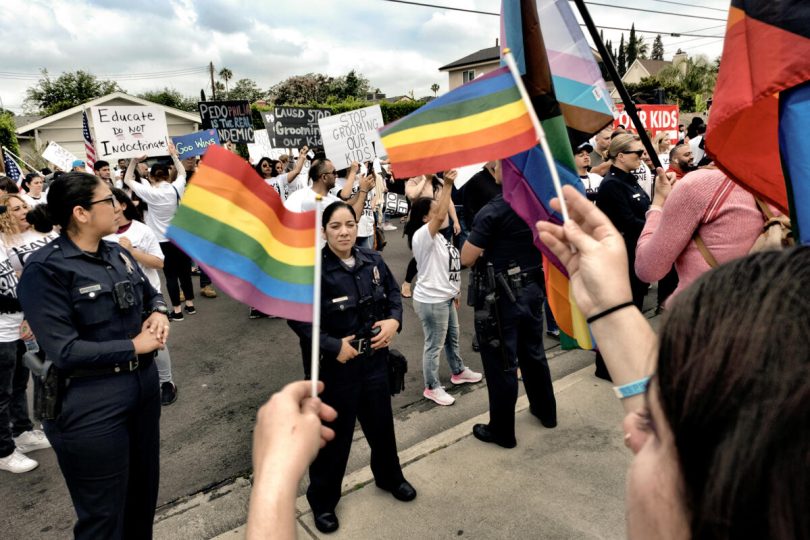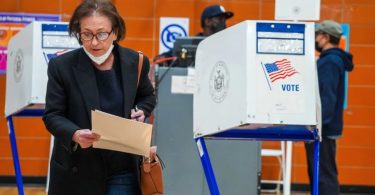Stay up-to-date with free briefings on topics that matter to all Californians. Subscribe to CalMatters today for nonprofit news in your inbox.
The battle over trans rights has mostly played out at school boards, but is now erupting in Sacramento as lawmakers seek to limit local authority on the issue.
Following a raucous, emotional hearing last week in the Assembly, legislators sent a bill, AB 1955, to Gov. Gavin Newsom that would stop school districts from notifying parents if a student starts using different pronouns or otherwise identifies as a gender other than what’s on school records.
Newsom has 12 days from receiving a bill to decide whether to sign it, and in this case it’s not a given that he will. Although he’s been a strong supporter of LGBTQ rights since he’s been in politics, last year he vetoed a bill that would have required judges to consider parents’ acceptance of a child’s gender identity in custody disputes. He said he was uncomfortable singling out a specific group and feared it could lead to attempts to curtail the rights of vulnerable groups of people.
And as Newsom increasingly plays to a national audience, he might inch more toward the center on controversial issues such as this.
Dramatic scene on Assembly floor
The scene Thursday on the Assembly floor is an indicator of how passionate people on both sides of the issue feel. Assembly Speaker Pro Tempore Jim Wood, a Democrat from Ukiah, repeatedly chastised Assemblyman Bill Essayli for speaking out of turn and off topic, at one point cutting off his microphone. Essayli, a Republican from Riverside, has been a vociferous opponent of this bill and other attempts to protect the rights of trans youth. A bill he proposed last year, AB 1314, would have done the opposite of the latest bill by requiring schools to notify parents of changes in a child’s gender identity. The bill never advanced from the education committee.
At one point in Thursday’s hearing, several Democratic lawmakers had to restrain Assemblymember Corey Jackson, a Democrat from Moreno Valley, as he moved toward Essayli. Jackson is a co-sponsor of the bill and a member of the Legislature’s LGBTQ caucus.
Another lawmaker, Assemblyman Evan Low, a Democrat from Cupertino, choked up as he recalled his own experience as a gay youth fearing his mother would disown him.
“The thought that I could be outed at any time. Where would I go? What would I have done?” Low said during the hearing. “The fact is, I am shaking and reliving this nightmare every single time (this issue comes up). I hope our experiences are recognized. This is not a partisan issue, it’s about human dignity.”
The bill passed 60-15.
Chris Ward, the bill’s author, said he was relieved the matter is now before the governor.
“The very personal decision for a student to come out should be on their own terms to whoever they choose to share that information with when they are ready. Teachers should not be the gender police,” said Ward, a Democrat from San Diego. “(This act) ensures that conversations about gender identity happen at home without interference from anyone outside of the family unit.”
Hot-button issue in purple areas
Ward’s bill comes on the heels of several California schools boards enacting parental notification policies in the past year. Most of those policies are on hold or have been tweaked since the state sued to stop the policy at Chino Valley Unified, but the debate rages on, especially in “purple” areas of the state that are politically divided.
A UCLA report last year found that students in purple communities were far more likely to make demeaning or hostile comments to LGBTQ classmates than students in blue communities, according to school principals surveyed for the report.
It’s no accident that parental notification policies are surfacing in purple areas such as Chino, said UCLA education professor John Rogers, co-author of the report.
“It’s absolutely a wedge issue. It speaks to the way conservative activists target purple areas to garner political advantage,” Rogers said. “Trans youth are the victims of a broader political battle.”
Parental notification and other anti-LGBTQ policies have an impact that stretches far beyond the classroom, Rogers said. They can lead to a broader climate of hostility that leaves LGBTQ youth feeling unsafe at school and in the community, he said.







